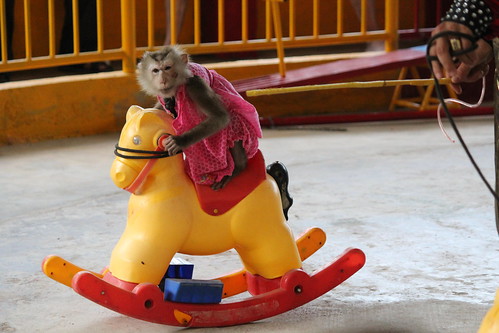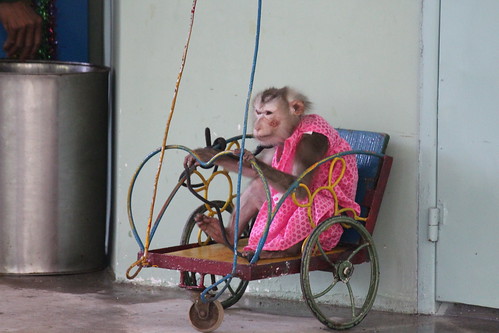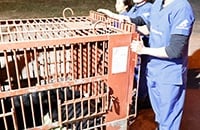TAKE ACTION: Help Queenie - a sad, damaged, terrified macaque that’s forced to perform
20 April 2017
Forced to perform, Queenie the macaque is clearly suffering from psychological damage, but the UNESCO-backed facility insists she is healthy and well-treated.
By Animals Asia’s Animal Welfare Director Dave Neale
Animal welfare is a complex issue. Providing a captive animal with a happy and healthy life involves a lot more than ensuring they have enough to eat.
Those who hold animals in captivity have a huge responsibility to meet the individual animal’s physical and their psychological needs. If we meet these needs the animal will be able to perform their natural behaviours as they would do in the wild.
Poor Queenie, the macaque (as we’ve nicknamed her) whose plight as part of an animal circus in a UNESCO-accredited national park in Vietnam has shocked people across the world, is a sad example of what goes wrong when an animal’s needs are not met.
Over 15,000 people have already signed the petition to close this cruel circus –please add you name today.
Queenie’s behaviour during the performance shows she is fearful of the trainers and experiencing stress due to the unnatural situation that she is forced to perform within.
Research into macaque behaviour has identified several facial expressions and their meaning.
The psychological damage endured by Queenie is visible in her “fear grimace”. This is an open mouth expression with teeth bared and ears flat against the head. Footage and images taken by Animals Asia investigators clearly shows Queenie, and many other macaques in the performance, exhibiting this behaviour.
One of the most shockingly overt signs of stress is self-harm. Sadly, Queenie is so traumatised she can be seen biting her own arms and legs in our investigators’ footage.
Other macaques in the show can be regularly seen trying escape the ringmasters and pulling away from them as they are forced to do more tricks. Usually, they reluctantly comply once they see the trainers’ sticks and whips.
We can conclude from this that these individuals have received a degree of physical punishment in the past and are now reacting to this threat from the trainer to avoid further punishment.
Clearly they have no natural desire to do the tricks expected of them. And that shouldn’t be surprising. These shallow gimmicks are completely unnatural to them.
Education is key
Like us, macaques are a social species. They live in active troops that can include up to 200 animals. They form complex social bonds with each other and develop long-lasting relationships.
Grooming, foraging, hunting, defense, and protection of the young are vitally important for them.
At the Can Gio Bioreserve, this information is evident from watching the abundant wild macaques interact with each other. This is what visitors need to learn in order to respect our primate cousins and such natural scenes are the reason tourists escape cities to visit pristine national parks like Can Gio.
The wild macaques at the bioreserve can be seen to be emotionally stable – there are no fear grimaces and no self-harm. But the animals trapped in the circus, don’t enjoy the luxury of social interaction, freedom and the ability to express natural behavior.
For the public to develop respect for nature and respect for animals they need to see these animals in their natural environment.
Fortunately, visitors to the reserve are surrounded by individual macaques living as they have evolved to live – able to use their natural abilities to live within the mangroves and to form complex social relationships.
Seeing animals in their natural environment is the greatest educational message that can be passed on to visitors at Can Gio.
But the tragic Monkey Island circus does the opposite. Exploiting macaques for unnatural performances gives a negative educational message to visitors. It gives false information as to the behaviour of these animals and demonstrates that we can control animals purely for our own entertainment. There is no respect or empathy in such a sorry show. In face, it is much more likely to teach visitors that animals are commodities to be used for our own benefit.
BACK







 5 reasons the dog meat trade must end
5 reasons the dog meat trade must end
 New year, new home for Christmas the Bear!
New year, new home for Christmas the Bear!
 Veterinary welfare training – pain management
Veterinary welfare training – pain management